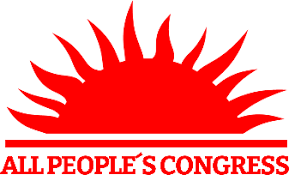There is something responsible for the proliferation of arms on our city and village streets since 2018 to date. Arms in the hands of poorly trained state security guards deployed at public places, patrolling in truckloads across the country in the last six years do not make us worthy to be called a ‘peaceful’ nation.
Guns everywhere paint a picture of an uneasy calm; it also earns the country the wrong publicity, not the hope that we can market the country as a tourist and investment destination, especially to first timers coming into the country.
Government’s advertisements of a mere state of conflict and instability that warrant the brandishing of guns everywhere is not encouraging for business, trace commerce and direct foreign investments.
Direct foreign investors with billions of dollars would hardly associate themselves with real broken economies, defiant foreign exchange regime, high cost of living, energy and bad tax policies. The high risk of doing business in Sierra Leone is another challenge government needs to urgently address and stop deploying armed military personnel everywhere, as if Sierra Leone is rapidly transforming into war-torn Ukraine. Investors do not take their monies to war zones.
Ships laden with cargo that used to make regular stops in the country no longer do so as they used to before April 2018. They blamed this on higher tax costs charged by the National Revenue Authority at the Queen Elizabeth II Quay. To this, economic and social commentators observed with concern that business and work momentum have dropped at the Sierra Leone Port Authority. Now there is no profitable business and investment going on in the country which is caused by high tax burdens on businesses.
Overtaxing, however, only leaves private businesses and investment weak resulting to a dying private sector with high interest loans to be paid to financial institutions. This situation does not encourage investor confidence especially amidst the worse inflation ever. Something needs to be urgently done about that by the appropriate authorities if only we are to solve this problem.
No sober investor would risk their capital in countries seated on a powder keg like Sierra Leone is being positioned in a web of political and economic instability caused by bad state governance and despotic leadership with regime protection strategies.
Calls have been coming from everywhere urging government to demilitarise communities and public places, which calls are legitimate, when looking at them from peaceful, stability, business and investor confidence perspectives.
You cannot call a friend to the table with a rifle in the other hand.
Armed security guards deployed all over the place cause tension, fear and panic in people, especially the business community. Intensifying armed security presence everywhere is scary, uncalled for and counterproductive. It affects the free movements of people and goods from one point to another. Hence take the gun guys off from the streets and restore private partners’ confidence to stay, work and do business in the country.
Guns everywhere means all is not well and peaceful in Sierra Leone as it says that government is implicitly sending a message to the public and the world over that they are only braving what can be referred to as a challenging governance circumstance with the escalation of security deployments around the clock against peace and freedom and other rights protesters.
State security operations should be conducted in the best interest of public safety of lives and property, and should not be seen as affecting the very livelihood of the civilians they claim to be protecting. Not everyone is happy with the proliferations of arms in the country, which is the more reason the public is imploring government to be clear about the current state of peace, security and the country’s level of stability.
It is that government is sensing something worrying that they do not want to tell the people? The people have rights to public information, more so about their general security and safety. Let the people know about what is happening in their country to give them enough heads up should there be need for them to take self-precautionary measures.
By mere common sense, talks of dialogue, peace and national cohesion between state actors – the two major political parties – the governing Sierra Leone People’s Party (SLPP) and the already defeated main opposition All People’s Congress (APC), should not have emerged from government since the controversial presidential election was announced by the chairman of the electoral commission for Sierra Leone, Mohamed K. Konneh, if there was no withdrawal from governance by the APC, a weak opposition that has resorted to compromising its stance with the incumbent behind closed doors.
What actually went wrong prior, during and even after the elections that warrants all the unnecessary calls for dialogue? Were electoral procedures conducted outside the last of the country’s elections laws? Were elections results unlawfully announced or something else went wrong that really continues to warrant routine armed security build ups and simultaneously yearning for dialogue and peace?
If yes then the ECSL chief must be held accountable for all post-election instability erupting in the country. Konneh, government, and the ECSL must provide the public with appropriate answers to these questions now that moral guarantors are in to help us fix the political stalemate.
The outcome of the controversial electoral process that declared Julius Maada Bio as ‘winner’ and president, while they came surprisingly for the SLPP, however saw the APC reverting to boycotting governance. They also affected investor confidence to the peak of mid-2018, when Bio took up office.
Since then there has been huge hold ups and withdrawals of major trade, commerce and investments from Sierra Leone. Those who tend to withstand the pressure are pro-ruling partisan investors who continue to win big government contracts in the name of private sector investments at the expense of the state, which have in recent past eroded genuine investor confidence. This has caused so many businesses to close shop with most of them fleeing the country for investment havens in the sub-region.
As all expectations are now yearning for government to aptly address post-June 24 social, economic and political challenges, we should focus on restoring investor confidence instead of wasting time and state resources on faceless protesters and that of a mad ruling partisan, Big Fish, who was recently gunned down.
State-sponsored brandishing of guns does not evoke the kind of confidence we hope to in investors. Government must come to terms with the realities, handle the current economic situation and get things done rightly as expected by demilitarising the streets across the country. No investor wants to bear the greatest risk of doing business in a war zone.
Something is certainly wrong elsewhere that government is ashamed or afraid of taking responsibilities and blames for. Who deploys the gun-toting, trigger happy weapon carriers all over the place to scare people and investors?
The dialogue and peace overtures now on the lips of every pro-government civic activist as if Sierra Leone has reverted to the odd days of the civil war, is unrealistic and should be curtailed.
Fear, tension and panic continue to scare dozens of direct foreign investors and businesses away from the country, fleeing in avoidance of major risks. The business atmosphere in Sierra Leone has been like this since April 2018 due to the facts tied the country’s doing business confidence indicators at the lowest ebb. And as such, no individual business and groups of investors would risk their billions of dollars into ethnically, politically and regionally toxic and polarised nations.
For a country to attract mass direct foreign investment there should assurance of business and investment friendly tax policies, peace, stability, national cohesion. A suitable environment for doing business should be promoted with impressive indicators rather than brandishing weapons aimed at killing faceless protesters.
So, we expect for this regime to demilitarise our streets and restore investor confidence like your predecessors did.














